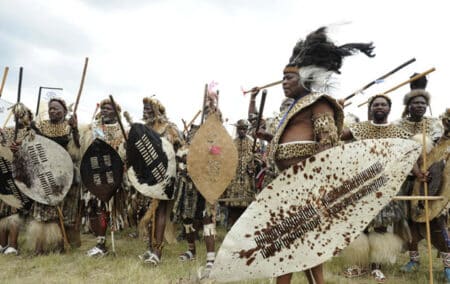The epic life of Shaka Zulu resurfaces in the new DStv telenovela, Shaka Ilembe, to smash TV records and remind us of his place in history.
Shaka Zulu is one of the most celebrated warriors in African history and his prowess as a military tactician gave him a reputation that will live forever. This is true, irrespective of what you make of him – the hero who gave the Zulu nation the dominance it still enjoys today, or the savage, barbaric dictator who could “order killings with just a nod”.
Shaka-philiac or -phobic, you see that one thing remains: he was a great military innovator and possessed the deadly combination of intellect and temperament required for the role he assumed.
His rise to power saw him leading a minor Nguni clan with an army of about 400 men and, through unification with neighbouring tribes, forging its dominance. He increased Zulu territory considerably, from just a few hundred to thousands of square kilometres. This ended with the subduing of much of the population in what would later be KwaZulu-Natal.
Conscripted military
He conscripted an army of 70 000 highly trained soldiers in a single decade. To achieve these feats, Shaka abolished all manner of privileges afforded to combatants, back then, by birthright and class. The highest standards of discipline and soldiering were required from his men, who were tested rigorously through continuous drills and military campaigns. Essentially, merit was the only way to ascend to high rank in his regiments, and this earned him much respect from his subjects.
Rigorous training resulted in the speed and agility that enabled his forces to outmanoeuvre their rivals. Zulu warriors would run and train barefoot, covering up to 40 kilometres to harden their feet. They would carry few supplies, prioritising speed. These were some aspects of the training that produced the most effective fighting force.
With his relentless commitment to high standards, and unswerving focus on the outcomes of his campaigns, I wonder what Shaka Zulu would have thought about the standards South Africans are tested against today. One can think here particularly of the vicious cycle of poor education coupled with rock-bottom standards of testing in schools and, ultimately, employment equity.
Successes
There is much to be learned from the successes Shaka and his army amassed, none of which relied on managing history or ensuring equitable outcomes according to a bureaucrat’s spreadsheet (or whatever the contemporary equivalent may have been), as is the case in the cycle mentioned above. He cultivated the skills of his army through mentorship, uncompromising standards and discipline, and arming his men with techniques and unique skill sets, including the bull-horn attack formation which he innovated. (He was curious about innovations from the outside world and felt that the firearms of the day could be overcome by the mobility training he inculcated in his troops.)
This made his warriors deployable for war at all times, ready to face all adversaries with little notice. His training methods are credited with handing the British army of the Victorian era one of its most humiliating defeats at Isandlwana in 1879, long after Shaka’s death. There are even some historical accounts alluding to later attempts by German and Belgian forces to recruit Zulu soldiers to their colonial armies, again because of the tradition of meritocracy Shaka instilled in his nation.
Yet even for his time, despite having a claim to a royal bloodline, Shaka was far from ‘privileged’. He had many of the socio-economic cards of the archaic, rural, late 1700s Natal stacked against him from birth. The name ‘Shaka’ itself was given to him to express the rejection of paternity by his father, Senzangakhona, who claimed that his mother Nandi’s pregnancy was nothing more than illness caused by the sting of the iShaka beetle. Yet he was able to achieve great success and take a much bigger Zulu nation along, persevering despite these odds.
Relinquish standards
To make Shaka Zulu understand employment equity would be to require him to relinquish the very standards that led to Zulu dominance. Clearly employment equity and other similar assaults on meritocracy would have no place in his reign. Placing low expectations on previously disadvantaged groups would not only not have worked on the battlefields of 1820s Natal: it would have been fatal.
Shaka bestowed on his men a reputation for excellence. He made appointments strictly according to meritocratic standards, without compromise. The low expectations of today would have devastated all that training had instilled in his regiments.
Controlling employment outcomes to address systemic issues is ineffective. In these times, we must look at the ghastly state of the public education system, and the lowered testing standards that only cover up the resultant poor education outcomes, with the whole disaster resulting in the government filling posts with people, many of whom would never have got the jobs without employment equity policies.
All of these elements point to the same thing in the grand scheme of covering up government failures. When meritocracy is compromised, you die – either at the hands of a better prepared, more competent combatant, as in the wars waged by the Zulus in the 1800s, or by never reaching your full potential and dying a slow death of sapped confidence and dwindling competence.
It’s hard to imagine Shaka approving.
If you like what you have just read, support the Daily Friend
Image: Flickr, GCIS


